Ditapis dengan
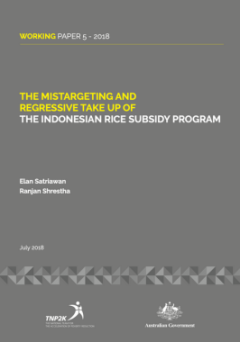
The Mistargeting And Regressive Take Up Of The Indonesian Rice Subsidy Program
We evaluate household participation in the Indonesian Raskin program, a national rice price subsidy program for the poor. Using a household panel from the 2000 and 2007 rounds of the Indonesian Family Life Survey (IFLS), we evaluate program participation over the duration of the year prior to the 2007 survey using four different measures of participation. We find that although the poor as a who…
- Edisi
- Working Paper 5 - 2018
- ISBN/ISSN
- -
- Deskripsi Fisik
- ii, 30 Halaman, PDF
- Judul Seri
- Working Paper
- No. Panggil
- 338.1959805 SAT t
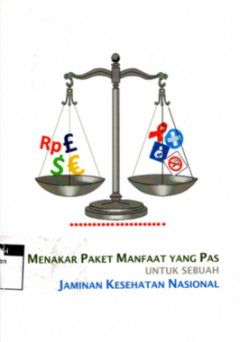
Menakar Paket Manfaat yang Pas Untuk Sebuah Jaminan Kesehatan Nasional
Sejarah jaminan kesehatan di indonesia sebenarnya sudah mulai sejak jaman penajajahan Belanda. pada saat itu pemerintah beanda memberikan jaminan kesehatan bagi pegawai negeri yang berkebangsaan Eropa. tidak lama berselang, Pemerintah Belanda juga memberikan jaminan keshatan bagi pegawai negeri pribumi walaupun dengan paket manfaat yang berbeda. selepas masa penjajahan, jaminan kesehatan bagi p…
- Edisi
- 1
- ISBN/ISSN
- -
- Deskripsi Fisik
- 72 Halaman; 29 cm, PDF
- Judul Seri
- Hasil Digitalization
- No. Panggil
- 368.4 TNP m

Journal of Human Development and Capabilities ; A Multi-Disciplinary Journal…
The Journal of Human Development and Capabilities is a peer-reviewed academic journal in the field of people-centered human development and capabilities. It is published by Routledge on behalf of the Human Development and Capability Association.
- Edisi
- Volume 13
- ISBN/ISSN
- 19452829
- Deskripsi Fisik
- 17,5cm x 24,5cm
- Judul Seri
- Textbook
- No. Panggil
- 301 HAQ j
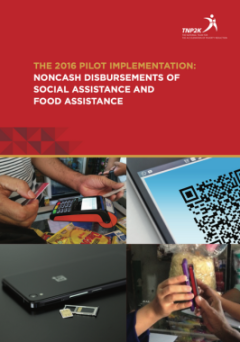
The 2016 Pilot Implementation Noncash Disbursements of Social Assistance and …
The instructions from the President of the Republic of Indonesia in several Limited Cabinet Meetings serve as the basis for implementing transformation of the Raskin/Rastra Program into the Noncash Food Assistance (Bantuan Pangan Nontunai/BPNT) in the form of food electronic voucher (e-voucher). The main objective of the BPNT Program is to improve the effectiveness and accuracy of the program …
- Edisi
- 1
- ISBN/ISSN
- 978-602-275-189-2
- Deskripsi Fisik
- xvii, 114 Halaman, PDF
- Judul Seri
- Textbook & Ebook
- No. Panggil
- 368.8 TNP t
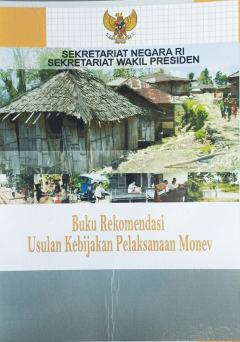
Buku Rekomendasi Usulan Kebijakan Pelaksanaan Monev
Dalam buku ini kami berupaya menguraikan secara rinci dengan bahasa yang sederhana, proses pelaksanaan monitoring dan evaluasi pengadaan barang/ jasa pemerintah serta monitoring dan evaluasi pelaksanaan anggaran.
- Edisi
- -
- ISBN/ISSN
- -
- Deskripsi Fisik
- i + 28 + 43 halaman ; ilustrasi berwarna
- Judul Seri
- Textbook
- No. Panggil
- 362.5 SEK b
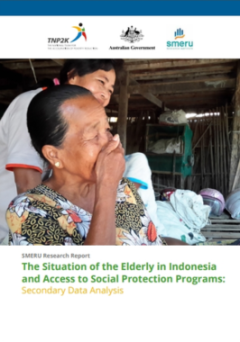
The Situation of the Elderly in Indonesia and Access to Social Protection Pro…
Indonesia is gradually becoming an ageing society. According to Susenas 2019, the number of citizens 60 years of age or older or elderly people in Indonesia has reached 25.7 million people, or about 9.6 percent of the total population (BPS 2019). The number of elderly people is predicted to continue to rise–to around 10 percent in 2020 and 20 percent by 2040 (BPS 2018, quoted in TNP2K and MAH…
- Edisi
- 1
- ISBN/ISSN
- 978-602-275-209-7
- Deskripsi Fisik
- x, 48 Halaman, PDF
- Judul Seri
- Textbook & Ebook
- No. Panggil
- 362 TNP t
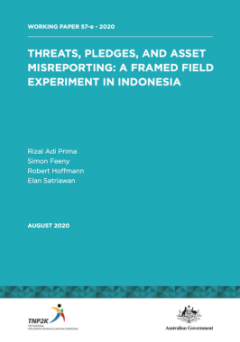
Threats, Pledges, and Asset Misreporting: a Framed Field Experiment in Indonesia
We investigate the impact of behavioural interventions on asset misreporting in the context of welfare benefits in Indonesia. Benefiting from a policy change allowing households to self-report their assets, we employ a series of framed field experiments with 599 welfare benefit applicants in 26 Indonesian villages to test whether two text stimuli interventions discourage dishonest asset self-re…
- Edisi
- Working Paper 57-e - 2020
- ISBN/ISSN
- -
- Deskripsi Fisik
- 56 Halaman, PDF
- Judul Seri
- Working Paper
- No. Panggil
- 363.7009598 PRI t
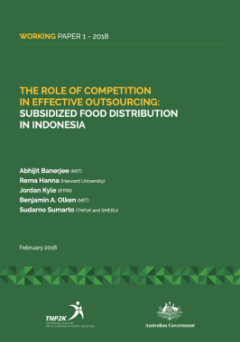
The Role of Competition in Effective Outsourcing: Subsidized Food Distributio…
Should government service delivery be outsourced to the private sector? If so, how? We conduct the first randomized field experiment on these issues, spread across 572 Indonesian localities. We show that allowing for outsourcing the last mile of a subsidized food delivery program reduced operating costs without sacrificing quality. However, prices paid by citizens were lower only where we exoge…
- Edisi
- Working Paper 1 - 2018
- ISBN/ISSN
- -
- Deskripsi Fisik
- ii, 64 Halaman, PDF
- Judul Seri
- Working Paper
- No. Panggil
- 338.1959805 BAN t
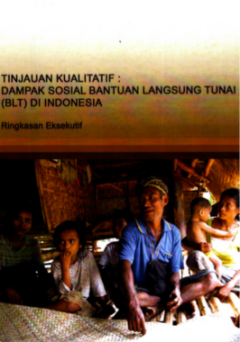
Tinjauan Kualitatif: Dampak Sosial Bantuan Langsung Tunai (BLT) di Indonesia
Bantuan Langsung Tunai (BLT) ditargetkan untuk mencapai sepertiga rumah tangga di Indonesia sebagai kompensasi terhadap penurunan subsidi BBM pada saat menukiknya inflasi harga untuk BBM dan bahan makanan, terutama beras. Uang tunai didistribusikan dalam beberapa tahap pada tahun 2005-06 dan pada 2008-09. BLT menarik perhatian publik karena adanya demonstrasi besar-besaran yang juga seringkali …
- Edisi
- -
- ISBN/ISSN
- -
- Deskripsi Fisik
- 9 Halaman, PDF
- Judul Seri
- Hasil Digitalization
- No. Panggil
- 362.5 HOS t
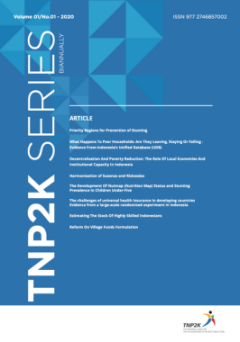
Jurnal TNP2K Series Vol.1 No.1 2020
One aspect of Indonesia’s health profile that still needs improvement is stunting. In 2018 Indonesia had one of the highest prevalence rates for stunting in the world at 30.8 percent. To achieve the National Medium- Term Development Plan 2015-2019 (Rencana Pembangunan Jangka Menengah Negara: RPJMN) target of a 28 percent stunting rate, in 2018 the government set priority areas for stunting pr…
- Edisi
- 1
- ISBN/ISSN
- 977 2746857002
- Deskripsi Fisik
- 255 Halaman, PDF
- Judul Seri
- Buletin
- No. Panggil
- 361.005 TNP j
 Karya Umum
Karya Umum  Filsafat
Filsafat  Agama
Agama  Ilmu-ilmu Sosial
Ilmu-ilmu Sosial  Bahasa
Bahasa  Ilmu-ilmu Murni
Ilmu-ilmu Murni  Ilmu-ilmu Terapan
Ilmu-ilmu Terapan  Kesenian, Hiburan, dan Olahraga
Kesenian, Hiburan, dan Olahraga  Kesusastraan
Kesusastraan  Geografi dan Sejarah
Geografi dan Sejarah